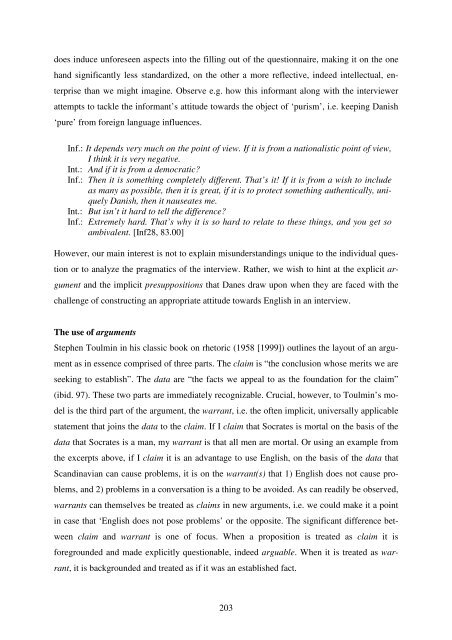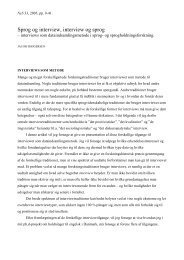Hør dog hvad de siger - Note-to-Self: Trials & Errors
Hør dog hvad de siger - Note-to-Self: Trials & Errors
Hør dog hvad de siger - Note-to-Self: Trials & Errors
Create successful ePaper yourself
Turn your PDF publications into a flip-book with our unique Google optimized e-Paper software.
does induce unforeseen aspects in<strong>to</strong> the filling out of the questionnaire, making it on the one<br />
hand significantly less standardized, on the other a more reflective, in<strong>de</strong>ed intellectual, en-<br />
terprise than we might imagine. Observe e.g. how this informant along with the interviewer<br />
attempts <strong>to</strong> tackle the informant’s attitu<strong>de</strong> <strong>to</strong>wards the object of ‘purism’, i.e. keeping Danish<br />
‘pure’ from foreign language influences.<br />
Inf.: It <strong>de</strong>pends very much on the point of view. If it is from a nationalistic point of view,<br />
I think it is very negative.<br />
Int.: And if it is from a <strong>de</strong>mocratic?<br />
Inf.: Then it is something completely different. That’s it! If it is from a wish <strong>to</strong> inclu<strong>de</strong><br />
as many as possible, then it is great, if it is <strong>to</strong> protect something authentically, uniquely<br />
Danish, then it nauseates me.<br />
Int.: But isn’t it hard <strong>to</strong> tell the difference?<br />
Inf.: Extremely hard. That’s why it is so hard <strong>to</strong> relate <strong>to</strong> these things, and you get so<br />
ambivalent. [Inf28, 83.00]<br />
However, our main interest is not <strong>to</strong> explain misun<strong>de</strong>rstandings unique <strong>to</strong> the individual ques-<br />
tion or <strong>to</strong> analyze the pragmatics of the interview. Rather, we wish <strong>to</strong> hint at the explicit ar-<br />
gument and the implicit presuppositions that Danes draw upon when they are faced with the<br />
challenge of constructing an appropriate attitu<strong>de</strong> <strong>to</strong>wards English in an interview.<br />
The use of arguments<br />
Stephen Toulmin in his classic book on rhe<strong>to</strong>ric (1958 [1999]) outlines the layout of an argu-<br />
ment as in essence comprised of three parts. The claim is “the conclusion whose merits we are<br />
seeking <strong>to</strong> establish”. The data are “the facts we appeal <strong>to</strong> as the foundation for the claim”<br />
(ibid. 97). These two parts are immediately recognizable. Crucial, however, <strong>to</strong> Toulmin’s mo-<br />
<strong>de</strong>l is the third part of the argument, the warrant, i.e. the often implicit, universally applicable<br />
statement that joins the data <strong>to</strong> the claim. If I claim that Socrates is mortal on the basis of the<br />
data that Socrates is a man, my warrant is that all men are mortal. Or using an example from<br />
the excerpts above, if I claim it is an advantage <strong>to</strong> use English, on the basis of the data that<br />
Scandinavian can cause problems, it is on the warrant(s) that 1) English does not cause pro-<br />
blems, and 2) problems in a conversation is a thing <strong>to</strong> be avoi<strong>de</strong>d. As can readily be observed,<br />
warrants can themselves be treated as claims in new arguments, i.e. we could make it a point<br />
in case that ‘English does not pose problems’ or the opposite. The significant difference bet-<br />
ween claim and warrant is one of focus. When a proposition is treated as claim it is<br />
foregroun<strong>de</strong>d and ma<strong>de</strong> explicitly questionable, in<strong>de</strong>ed arguable. When it is treated as war-<br />
rant, it is backgroun<strong>de</strong>d and treated as if it was an established fact.<br />
203



